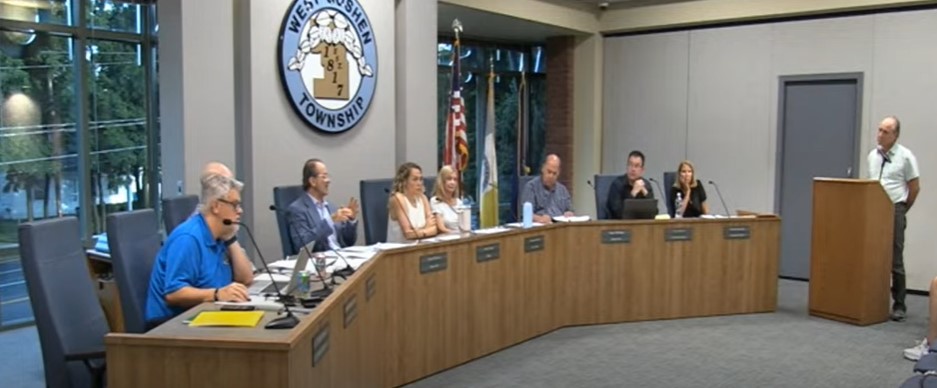Despite opposition from many residents, the West Goshen supervisors on July 2 unanimously voted to require a conduit to install wiring for electric vehicle chargers in new subdivisions.
The change to the subdivision and land development ordinance (SALDO) has been under consideration for more than a year, promoted by the Sustainability Advisory Committee (SAC). However, the township’s Planning Commission twice voted against the change.
Chair Ashley Gagne said builders could come to the board and request to opt out of the mandate.
Charles Golden, a retired professional engineer and project manager, has offered suggestions about the ordinance to the committees and supervisors. Golden had recommended that they change the language in the ordinance to “may” instead of “shall” so the conduit clause would not be a mandate. He also said that SALDO is not the correct section in the township’s ordinances to make those changes.
Golden said depending on various factors, installing the conduit could add $300 to $3,000 to the cost of a new house.
Golden said, “The present document looks more like someone tried to make a movie out of the scraps off the editing room floor.”
Giving developers a chance to opt-out could lead to “quid pro quo governance,” Golden said. “The voters don’t want to surrender their independence and be forced into the EV market. I go by the ‘you first’ rule. You should all own EVs before mandating to us. Surely, stop driving the biggest made RAM trucks.”
Golden read a statement from County Commissioner Eric Roe, who sent similar remarks to DVJournal, opposing the ordinance. However, Roe supports electric vehicles and hopes “to be able to afford a Tesla someday.”
“But when government requires people buy things they don’t need or plan to use, it crosses a line,” said Roe. “There are better ways of encouraging and incentivizing free people to make choices that benefit society, rather than mandating it by using the heavy hand of government. Also, I must note that it is extremely expensive to buy a house in Chester County these days. When townships mandate new building requirements, those requirements are passed onto the consumer, making housing even more expensive.
“It’s ironic that many of the same people who talk about affordable housing so frequently are the same people making housing less affordable,” said Roe. The other two county commissioners, both Democrats, did not respond to a request for comment.
Steve Johnston, who has a master’s degree in engineering and one in physics, said, “To be honest, it takes nine years before you get carbon neutral in an EV. It’s been studied over and over again. The cobalt mining alone that’s happening in South Africa for EVs is destroying and poisoning the continent…My concern with it is just to incentivize it. Don’t mandate it.”
Johnston added, “EV sales have plateaued. They’ve actually gone down 15 percent…They made up only 7 percent of the total sales. There’s 3.81 million cars sold, 260,000 of them are EVs…In California, a great state for mandating, they are failing at this, left and right. We live in West Chester, not California. We have a great mix of the middle ground of everything…To mandate is enforcing, and you’re not giving people the choice…If EV is the future, let people do it. Let them make the choice of getting an EV. Don’t force it.”
About 35 people came to the meeting and the audience loudly applauded him.
Several members of the SAC spoke in favor of the ordinance.
One of them, Scott DeLeone, said it is less expensive to install a conduit for an EV charger before a house is built than afterward.
“We need to do something to reduce the amount of gasoline and other fossil fuels, and right now, this is a policy way,” he said. They are not making homeowners retrofit their homes but only requiring the conduit in new homes. “We thought it was good balance,” he said. Phoenixville and Whitemarsh Township already have similar ordinances, he said.
Eric Tooke pointed out that the new ordinance could lead to litigation because it’s “very vague.” The township would then bear the cost of litigation.
“If you own an electric car, you’re responsible for charging your car,” he said. “Just like I’m responsible for putting gas in my car. If I run out of gas, that’s my responsibility.”
Karen Tooke objected to the mandate and asked why they were about to approve something their Planning Commission opposed.
“You can choose not to buy the home,” said Gagne.
“We as a board listen to all the input,” said Supervisor Shaun Walsh. They listened to residents’ input and made changes. “The board believes there is a benefit and that this is really encouraging developers and builders of new homes to think about what a better future might be in terms of providing a sustainable future. In this case, giving people an easier way to put in EV chargers at home if they so desire.”
The extra cost is “a drop in the bucket,” and the SALDO has other requirements like stormwater management, landscaping, or sidewalks, he said.
Please follow DVJournal on social media: Twitter@DVJournal or Facebook.com/DelawareValleyJournal

